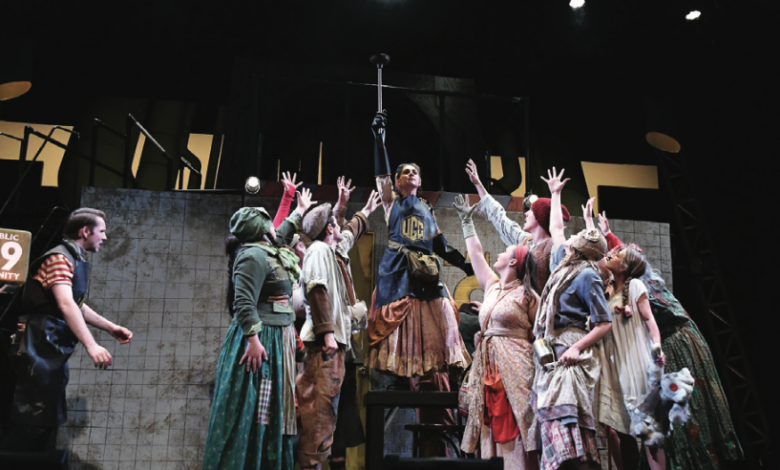
Urinetown’s’ satirical genius gives unique edge
By Zachary Klein
Going to the bathroom is something everyone takes for granted. No matter where we are, it always seems like someone is looking for a restroom. Now imagine a world where this basic human right is taken away and the citizens of a community are unable to appease their bladders.
That’s the world pictured in “Urinetown.”
The first Rider production of the year opened Oct. 7 at the Bart Luedeke Center (BLC) Theater, and it was quite the experience. It’s unlike any musical I have ever seen from the plot, to the book, down to the lyrics of the songs. Everything in this show is comedy taken to another level. I would even call it a satirical heaven filled with incredible stupidity that somehow works.
When “Urinetown” premiered on Broadway in September of 2001, it presented a dystopian society that was not far off from what was going on in the world at that time. Fast forward 21 years later, the show is still relevant in today’s ever-changing society.
As climate change continues to impact our environment, the show’s plot line, which highlights the issue of not having enough water, is something that politicians should listen to. From the first lines of the script written by Greg Kotis, we learn that this community has to pay a fee to use the restroom in order to regulate the water supply.
“Urinetown” is more than just a show about toilets, though. By telling hundreds of jokes, including some about itself and the concept of a musical as a whole, Kotis along with composer Mark Hollman are able to tell a compelling story about a community who wants nothing more than just to live life uninterrupted. This means intertwining family, friendships and romantic relationships to carry the plot forward.
Penelope Pennywise, played by senior musical theater major MK Leonard, and Bobby Strong, who was portrayed by junior musical theater major Thomas Higgin, run “Public Amenity #9” where citizens can pay to use the facilities. These amenities are run by the Urine Good Company and owner Caldwell B. Cladwell played by junior musical theater major Evan Blackwell.
When Caldwell’s daughter Hope, played by senior musical theater major Nicole Simpkins, sides with Strong and the citizens in a rebellion, things take a turn for the worse. Throughout the show, there is fear of being transported to an area called Urinetown. The citizens hide out in a secret location while Strong negotiates a deal with Cladwell. During this time, the citizens kidnap Hope and hold her hostage. Cladwell and Strong are unable to reach a deal, and so the latter is taken to Urinetown by Officer Lockstock, played by junior musical theater major John Doty, who is also the narrator of the show. The audience then learned that Urinetown isn’t a real place; it simply means death.
After Hope is released, she proceeds to seize her father and take over as the president of Urine Good Company. Because she does not use her father’s tactics, everyone dies of thirst and loses “hope” (a brilliant example of the satire) that Urinetown can survive into the future.
Capturing all this humor and plot action is not an easy task for a director, but seasoned actor, director and educator Todd Buonopane managed to get all the areas in order. All creative aspects, notably the dystopian-esque sets designed by Yoshinori Tanokura and the heterogenous, but appropriate costumes designed by Jim Parks, being juxtaposed with neat choreography by Buonopane, fit the direction that the show headed in. However, with sets and costumes staying stagnant for virtually the entire show, there were times where it was difficult to see transitions through.
For most of act one, I was unable to tie together everything that was going on. I liked every individual aspect, but did not see the cohesion that was necessary for things to make sense. The jokes registered, the songs were memorable (mainly because of the insanity of the lyrics) and the performances were captivating. But the glue between the plot and the performers was not adhering. Once act two started, however, there was one song that changed that — “Run Freedom Run.”
As the orchestra, led by musical director Peter de Mets, started playing this catchy tune, I noticed a shift in the style of music from contemporary to gospel. While Higgins and the ensemble belted out this anthem, I knew this was what I needed. The cohesion was forming between the plot and the actors on stage, and the rest of act two, especially standout performances by Simpkins and Blackwell, but with contributions from the entire cast, led to a smooth finish to a fantastic production.
“Urinetown” is a true example of a show that should not be judged by its name or plot. With the right factors in place, a great production of this show can be produced, and Rider was able to accomplish an exceptional presentation of this show. It was a great kickoff to their 2022-23 season. Most importantly, you’ll be grateful you are able to use the restroom freely after the show and not have to save up pennies just to do something that is necessary.



